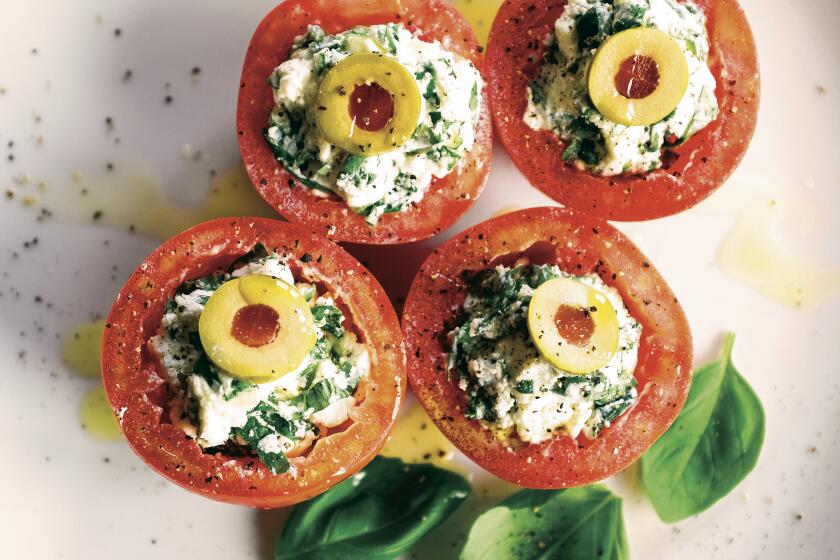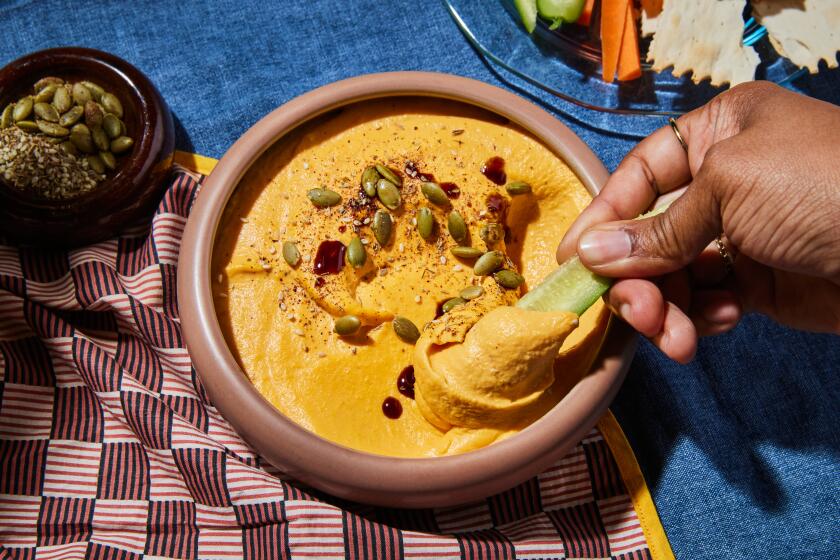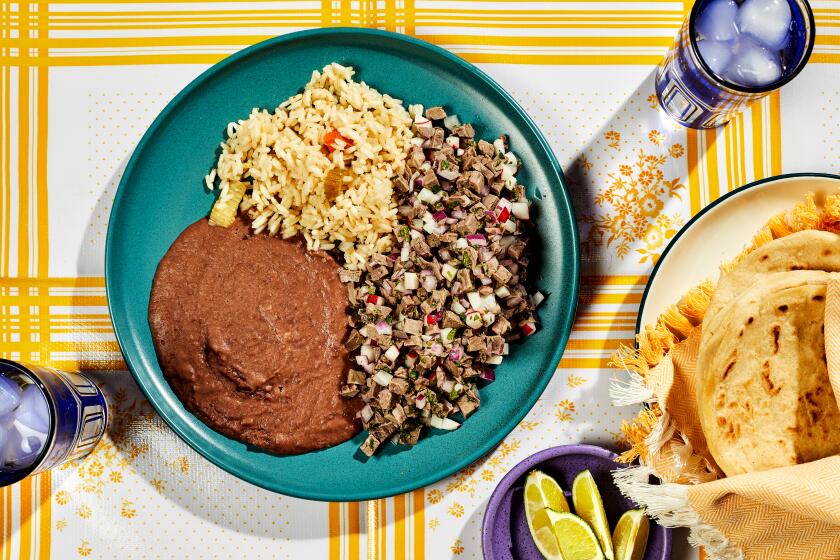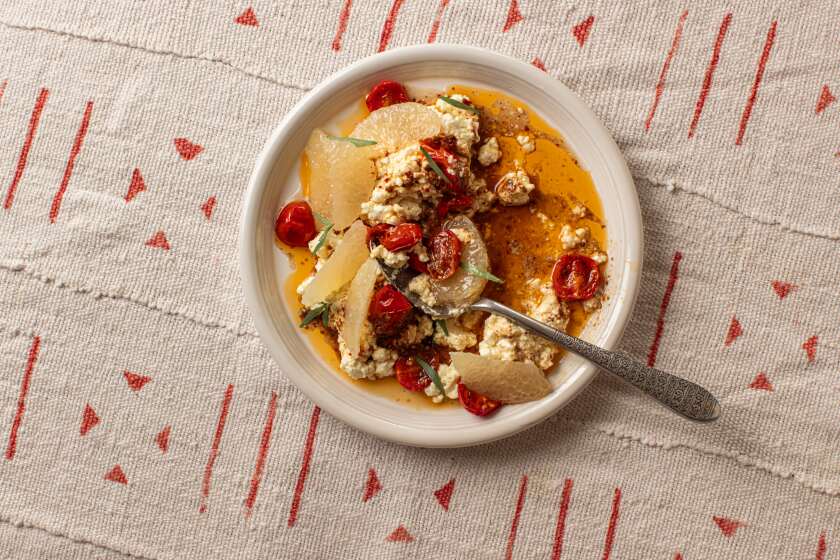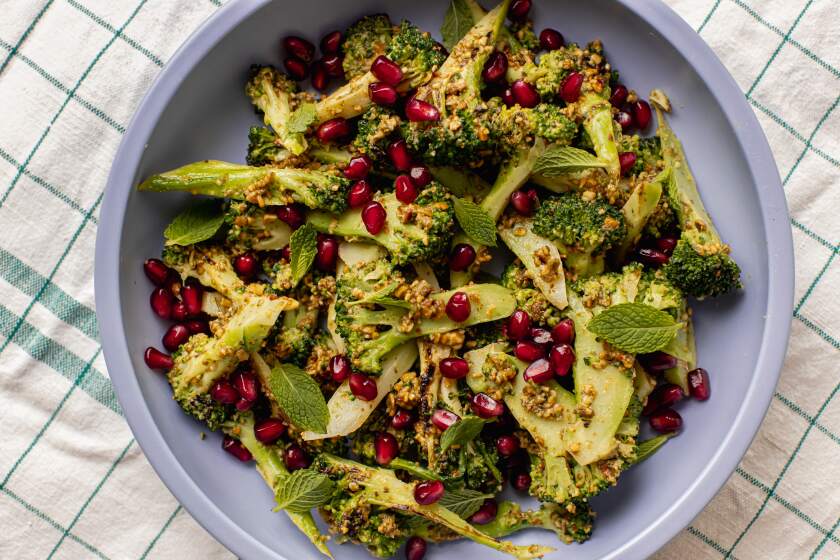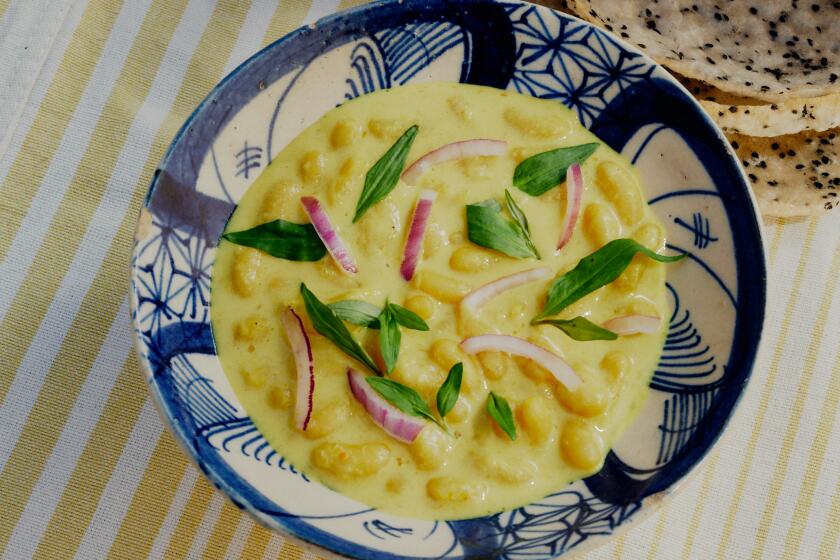Turnip and red pepper salad
- Share via
Alain Cohen holds out a gorgeous spiral-shaped loaf of challah, the color of cherry wood. On the top of the bread is a graceful open hand made of dough. Cohen and his baker, Yuri Amsellen, have been experimenting again. From the crowded kitchen of Cohen’s Pico Boulevard takeout shop, Got Kosher? Provisions, comes the hypnotic smell of yeast.
In the weeks before the Jewish new year, the store has baked loaves in the shape of Jacob’s ladder, and others in a circle with a well in the center, meant to hold honey for dipping. They’ve added dried fruits, apples and raisins.
For Rosh Hashana, which begins Friday at sunset, challah is essential. The braided oval bread that Jews break and share after lighting candles each Sabbath gets reworked once a year into a spiral to call to mind the cycle of life.
A loaf topped with an open hand, however, is uncommon. But in this, as in other food customs, Tunisian Jews have their own way.
“It’s something from Djerba, to mark a period of reflection before Yom Kippur, a time when Jews are asking for and receiving judgment from God,” says Cohen, whose mother’s family comes from that island, located off the coast of Tunisia, where a small community of Jews traces its heritage back more than 2,500 years.
Cohen, who with a partner made the short documentary film “The Jews of Djerba,” today is the chef-owner of Got Kosher? Provisions, in the Pico-Robertson neighborhood, and is working to spread the word about Tunisian food.
“Kosher food can be great,” but in the United States, it too often is not, he says. “It should be something you don’t have to apologize about.”
Sephardic Jews, those from the Mediterranean region including North Africa and Spain, were blessed with the region’s bounty of ingredients; Ashkenazi Jews, who come from Eastern Europe and make up the majority of Jews in this country, had a smaller palette from which to work.
There’s a joke that’s told of a Jew who invites a non-Jewish friend to a Passover meal. Afterward, the guest remarks that the food wasn’t too good. “It’s not supposed to be,” the Jew says.
That joke “never would have been told in a Sephardic community,” says Clifford Wright, a Santa Monica cookbook author, teacher and expert on Mediterranean food. In Tunisia, “the food is so exotic and interesting and spicy hot,” Wright says.
For this Rosh Hashana, a couple of dozen people will join Cohen and his partner in life and in business, Evelyn Baran, at their table. Like for a Passover Seder, many Tunisian holiday tables will hold about a dozen symbolic foods over which prayers are said.
Figs, apples and honey are there for prayers for a sweet year. Dates are included so “that we elevate ourselves like palm trees and that our sins disappear forever,” Cohen says. Sesame seeds suggest a proliferation of virtues. A fish symbolizes fertility.
Most powerful to Cohen are spinach leaves, thinly sliced pumpkin and garlic cloves, which are fried in an egg batter and dipped in honey or a sugar syrup. The garlic and pumpkin are to ward off enemies, the spinach a symbol of renewal.
“Just an amazing taste. It’s amazing. For me, it’s like Proust’s memories,” says Cohen, 53. “It is those tastes I am looking forward to.” He also recalls that Jews would pierce a quince with cloves, to make a pomander they’d keep for the nine days from Rosh Hashana to Yom Kippur.
Jews fast on Yom Kippur, and the smell of the pomander worked to ward off feelings of hunger, he says.
In his childhood home in Paris, he says, neighborhood women would come to cook with his mother, who would send the men off to Rosh Hashana services. The feast would include fava beans with cumin; grilled lamb’s liver stew; a frittata with ground chicken and lemon juice; a selection of salads; and t’fina pkaila, a stew of spinach, beef, sausage and beans, served over couscous.
Not a week goes by without couscous, with meat or fish, beans and vegetables.
“Every Tunisian family, every Friday night of their life, eats it. There is no escape. There is no need for escape. Everyone is happy to eat it,” Cohen says.
“Some people have milk when they’re growing up. We had couscous,” says Amsellen, the baker at Got Kosher? His family moved from Morocco to Lyon, France, where he was raised and went to cooking school.
In Paris, where Cohen’s father had a kosher restaurant, now run by his brother, called Les Ailes (the Wings). It was next door to the Folies Bergere cabaret, and Cohen says that as a child he was told there was a hole in a restaurant wall through which he could see the showgirls next door. He jokes that he looked for that hole for 20 years but never found it.
He started busing tables at age 9, and later became a waiter, bartender, chef and manager.
Twenty-eight years ago, he came to Los Angeles to attend the American Film Institute.
“I came here to escape the food business, Tunisia and the French. I put a continent and an ocean between myself and my family,” he says.
And, of course, he eventually found himself back in the food business -- at first, he says, out of necessity; later, it became a joy.
Got Kosher? began as a wholesale business, with the store opening in July 2008. It stocks items that Tunisian Americans will recognize, such as fish roe called boutargue (similar to Italian bottarga) and the “Tunisian sandwich,” which holds tuna, egg, potato, olives, peppers and other ingredients. The shop’s harissa is made on premises , and, with advice from Cohen’s father’s butcher in Paris, Cohen has developed a line of sausages that includes kosher merguez and andouille.
And word has been spreading fast about their pretzel challah, which is a sellout most weeks.
Cohen and Amsellen worked furiously for 2 1/2 months to develop the bread and began selling several versions in January, plain and with chocolate chunks, sesame seeds or green olives, among others. The dough is eggless and lighter than traditional challah.
“I spent hours and hours and hours tasting challah. In the end, I couldn’t even feel it anymore,” Amsellen says.
For Rosh Hashana, there will be spiral-shaped pretzel challah in several varieties, as well as traditional sweetened dough challah -- one with apple, raisins and honey and one with only raisins. The bakers plan to top them all with open hands.
But the point is to share the bread with others.
His father’s restaurant, Cohen says, was a second home to Tunisian immigrants and gave him a sense of community that he couldn’t find in this country until he began cooking Passover Seders for upward of 50 people -- mostly Jews who also felt rootless in Los Angeles.
“It was so wonderful that every year it became bigger,” Cohen says, with guests from France, Colombia, Mexico and northern Africa all telling the stories of their heritage, their families.
Still, it wasn’t enough.
“The rest of the year I was missing Tunisian food. If you grow up with it, this food really marks you,” he says.
“I realized that my father, despite my resistance, gave me a beautiful gift -- cooking and tradition. You try to escape your destiny, but it always catches up with you.”
Stem the turnips, then peel their white outer skin, leaving as much of the purple skin attached as possible. Quarter the turnips lengthwise, then slice them lengthwise as thinly as possible, no thicker than one-eighth inch, preferably on a mandoline.
Stem and seed the bell pepper and slice similarly into very thin lengthwise strips.
In a large bowl, combine the turnip and pepper slices. Sprinkle 1 tablespoon salt over the slices and toss to completely combine. Set the mixture aside for at least 30 minutes, preferably an hour, until the slices are wilted.
Place the wilted slices in a colander and run under cold water to remove all traces of salt. Drain and place in a medium bowl.
Stir in the lemon juice and remaining salt. Taste and adjust the seasoning as desired. Refrigerate at least 30 minutes before serving.
Get our Cooking newsletter
Get a taste of Los Angeles — and the world — with recipes and kitchen tricks from the L.A. Times’ Cooking newsletter.
You may occasionally receive promotional content from the Los Angeles Times.











